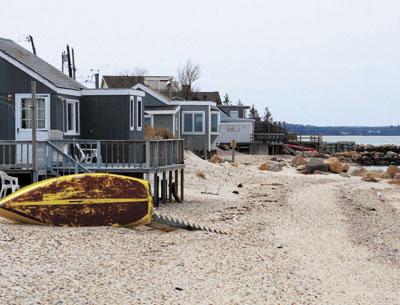Lazy Pointers Object to Land Lease Increases

Residents of Lazy Point in Amagansett, whose houses are on land leased from the East Hampton Town Trustees, attended the panel’s meeting on Tuesday, criticizing a proposed substantial increase in their lease fees, which are now $1,500 per lot per year.
One resident after another charged that the trustees were seeking to turn Lazy Point into a “cash cow” or use it to finance legal expenses. They asserted that the fourfold increase, which had been proposed at the trustees’ Jan. 13 meeting, would force them out and ruin the neighborhood’s character.
The meeting was a replay of one a year ago, when the trustees first proposed a substantial increase in the fee but ultimately left it alone after lessees complained. Now, however, the trustees are intent on at least a closer alignment of the fee with what they consider the lots’ market valuess.
With residents crowding the meeting room and spilling into the hall of the Donald Lamb Building on Bluff Road in Amagansett, Tom Knobel, a former trustee who also is a former town councilman and former Lazy Point resident, noted that because many of the houses at Lazy Point occupy two lots a fourfold increase would likely force residents to sell their houses, “and the character of Lazy Point that you have tried to maintain . . . will be even more changed to exactly what you claim you don’t want.”
Rick Drew spoke for the residents, describing his love and respect for the Lazy Point community and saying it is a diverse mix of “local, respectful families seeking to plan a stable and fair future at Lazy Point.” He called for gradual, incremental increases instead, combined with a “substantial, immediate transfer fee increase” on the sale of houses. That, he said, would both provide the highest possible revenue for the trustees and be fair to longtime residents, many of who are on fixed incomes. He said he could send the trustees the tenants “compromise” proposal by Feb. 2.
Greg Mansley, who owns property near the land owned by the trustees, said the “shock effect” of a sharp increase in the fee “without knowing how that came about” suggested it was intended for “legal fees that maybe shouldn’t be spread among ‘Lazy Pointers,’ but the whole town.”
Diane McNally, the trustees’ clerk, apologized for “a January meeting where you feel shock,” but said January was the traditional month in which annual resolutions, including fee schedules, are passed. She spoke emotionally about the trustees’ efforts to manage the town’s resources, mentioning docks, moorings, beaches, and shellfish.
“It’s the fees attached to uses of these public resources that are so precious to this community, and are getting so finite,” she said. Fees for Lazy Point, she said, “are attached to what we can do to protect the area” and a means to “ensure that everyone remembers the value of that area and its benefit to this community.”
Citing projects such as water-quality monitoring and eelgrass restoration, Stephanie Forsberg, the assistant clerk, implored the residents to acknowledge that a $1,500 annual lease “is so low and not consistent with what it should be. We’re not looking to change the character,” she said, “but we do have to be able to fund all the projects, all the goals, everything I believe in and the reason I am a trustee. . . . I don’t think it’s fair to say you shouldn’t have any increase at all.”
Bill Taylor, a trustee, said he had spoken with the town’s three assessors earlier in the day, who said they would devote time to determining the lots’ value later in the week. The property’s value must be determined, he said, while emphasizing the importance of maintaining Lazy Point’s character. “I mean, look at Ditch Plain,” he said of the popular oceanfront neighborhood in Montauk. “This town doesn’t need any more fedoras.”
Ms. McNally said the trustees would continue the discussion among the whole panel, with a subcommittee to consider Lazy Point matters, and with “our other town constituents.” Any changes, she said, have to be adopted before March.
